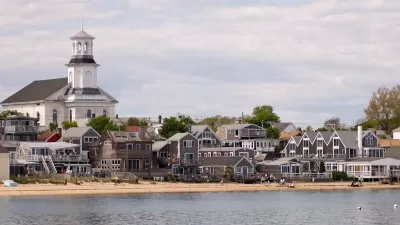While some agree that the plan has financial merit, others fear the social costs of mixing incomes in public housing neighborhoods. The authority's chairman sees it as a win-win.
Batya Ungar-Sargon discussed the details that have begun to emerge about the New York City Housing Authority's (NYCHA) controversial plan to allow private developers to build on "under-used" land at public housing sites located in "prime real estate areas," such as the Upper East and West Sides and the Lower East Side.
"The proposal will use the citywide 421a housing subsidy, which means that in exchange for 20-year property tax abatements, developers will set aside 20 percent of the new units for affordable housing. 'Affordable' means that the apartments will be made available to families who earn up to 60 percent of the regional Area Median Income (or $49,800 for a family of four), while the other 80 percent will charge market-rate rents."
"'If all sites currently under consideration are offered and attract acceptable bids, 4,000 to 4,500 apartments could be created,' Sheila Stainback, NYCHA's spokeswoman, writes in an email. Parking lots will be the most common spot for the new buildings to be erected. 'NYCHA will work closely with residents to restore green space in other parts of the developments and to replace parking,' Stainback writes."
"However, some advocates and experts think the arrangement NYCHA has described is not a good enough deal for land in such high demand, especially given the tax break that's involved. 'That is the tax deal given to developers on private land,' says Eliot Sclar, Director of the Center for Sustainable Urban Development (CSUD) at Columbia University's Earth Institute. 'In this case, they are privatizing public resources; they should leverage it much more,' Sclar adds."
"Others are worried not about the financials as much as the initiative's impact on public housing. Judith Goldiner, attorney-in-charge at the Legal Aid Society's Civil Law Reform Unit, says that public housing was built to be dense, with vacant space to compensate. Building on that vacant land would mean a compromise in quality of life. She also fears that the federal government might adjust its funding to reflect NYCHA's new lease income."
FULL STORY: Details Emerge About Plan for Private Buildings on NYCHA Land

Maui's Vacation Rental Debate Turns Ugly
Verbal attacks, misinformation campaigns and fistfights plague a high-stakes debate to convert thousands of vacation rentals into long-term housing.

Planetizen Federal Action Tracker
A weekly monitor of how Trump’s orders and actions are impacting planners and planning in America.

Chicago’s Ghost Rails
Just beneath the surface of the modern city lie the remnants of its expansive early 20th-century streetcar system.

Bend, Oregon Zoning Reforms Prioritize Small-Scale Housing
The city altered its zoning code to allow multi-family housing and eliminated parking mandates citywide.

Amtrak Cutting Jobs, Funding to High-Speed Rail
The agency plans to cut 10 percent of its workforce and has confirmed it will not fund new high-speed rail projects.

LA Denies Basic Services to Unhoused Residents
The city has repeatedly failed to respond to requests for trash pickup at encampment sites, and eliminated a program that provided mobile showers and toilets.
Urban Design for Planners 1: Software Tools
This six-course series explores essential urban design concepts using open source software and equips planners with the tools they need to participate fully in the urban design process.
Planning for Universal Design
Learn the tools for implementing Universal Design in planning regulations.
planning NEXT
Appalachian Highlands Housing Partners
Mpact (founded as Rail~Volution)
City of Camden Redevelopment Agency
City of Astoria
City of Portland
City of Laramie




























